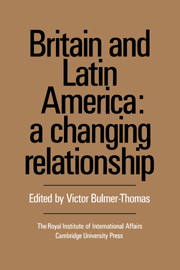Book contents
- Frontmatter
- Contents
- List of contributors
- Preface
- 1 Britain and Latin America in historical perspective
- Part I Cultural and political relations
- Part II Economic relations
- Part III Sources of friction
- 9 Further forward thoughts on the Falklands
- 10 British relations with Latin America: the Antarctic dimension
- 11 The illicit drug trade
- Part IV Conclusions
- Index
11 - The illicit drug trade
Published online by Cambridge University Press: 02 December 2009
- Frontmatter
- Contents
- List of contributors
- Preface
- 1 Britain and Latin America in historical perspective
- Part I Cultural and political relations
- Part II Economic relations
- Part III Sources of friction
- 9 Further forward thoughts on the Falklands
- 10 British relations with Latin America: the Antarctic dimension
- 11 The illicit drug trade
- Part IV Conclusions
- Index
Summary
The average citizen of the United Kingdom has only a superficial knowledge of the problems caused by illicit drugs and the writer was no different until a military posting to Central America (as Commander of the British forces in Belize) brought the difficulties home in a most vivid manner.* Across the world drugs have been smoked, chewed or sniffed for thousands of years. We have learnt how Helen of Troy offered Telemachus nepenthe in Homer's Odyssey and there is definitive evidence of the use of coca leaves as stimulants found on pottery and in wall-paintings of the Amerindians. The coca shrub enjoyed a pre-eminent position in the Inca Empire and it was regarded as a sacred manifestation of divinity, which was buried with the deceased to speed them on their way to another and better world.
Unlike tobacco and chocolate, coca was never exported to Europe from the Americas under Spanish rule, although the Moors are thought to have brought marijuana to Spain from Africa for use as a tranquilliser or pain-killer. Opiates from the East made their appearance in Britain largely through the successes of the great British trading companies. Clive of India was an addict for twenty years, before dying in a fit after a double dose of opium. Whilst the British East India Company's opium trade was finally curtailed towards the end of the nineteenth century, cocaine had by then begun to make its appearance in the Western world – first as a wonder-drug manufactured by the US pharmaceutical firm Parke-Davis.
- Type
- Chapter
- Information
- Britain and Latin AmericaA Changing Relationship, pp. 186 - 202Publisher: Cambridge University PressPrint publication year: 1989



